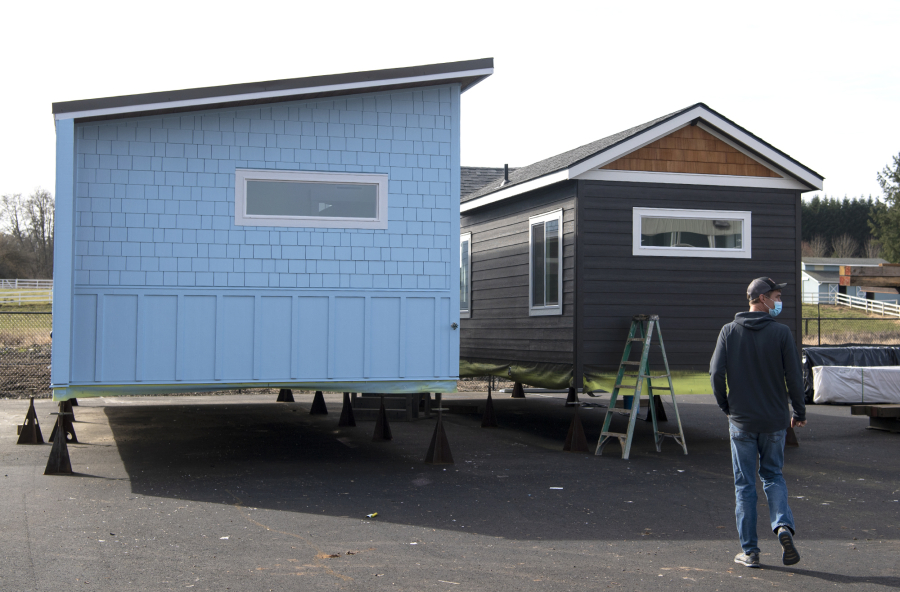BATTLE GROUND — Wolf Industries has a new home, marking the Battle Ground-based housing company’s second major expansion since it began building tiny houses in 2016.
The COVID-19 pandemic has boosted Clark County’s already-hot housing market to record levels, and the boom extends all the way down to the smallest homes. So while Wolf Industries’ modular units themselves may be tiny, President and co-owner Derek Huegel says it was time for the company to think bigger.
The new facility at 607 S.E. Eaton Blvd. is slightly less than 21,000 square feet, more than double the size of the company’s previous home in the industrial area south of Battle Ground Village. Most of the building consists of a cavernous warehouse interior where tiny houses move through a production line. The remainder is a two-story office area for employees who handle orders and delivery logistics.
The company began operations at the new facility in January, Huegel said, and has quickly ramped up production. Double the square footage means double the capacity; the new factory has room for up to eight houses of any size under construction at once, plus a larger outside lot to store completed builds until they’re shipped out.
The new facility cost about $2.7 million, according to Huegel, although he said that estimate doesn’t account for the fact that the company was able to do much of the construction work in-house.
Tiny houses
Huegel got started in construction as a teenager and initially founded Wolf Industries as a contractor brand. He said he began to think about prefabrication because he grew frustrated with the amount of travel he was doing between remote job sites.
The company built its first two experimental tiny homes in 2016 and scaled up from there, culminating in the opening of the Battle Ground Village factory in 2018. The main appeal of pre-built housing is the efficiency of having everything under one roof, Huegel said, describing it as “bringing the work to the people.”
Wolf Industries’ tiny homes range from 300 square feet for the smallest one-bedroom model to 612 square feet for the biggest two-bedroom configuration. The homes range from about $55,000 to $150,000 depending on the model, interior and exterior finishes and other services ordered.
Most are purchased as accessory dwelling units on property with existing houses, Huegel said, although some are purchased as standalone houses on new property. There are also multi-unit orders for projects being developed by groups like the Vancouver Housing Authority and the nonprofit Community Roots Collaborative.
The company offers full-service installation including on-site foundation construction and staff to move the project through the permitting process. Deliveries are also handled in-house using a custom trailer bed for oversize loads. The full process takes about four to six weeks.
“In general, we’ve always enjoyed doing everything,” Huegel said.
Wolf Industries primarily serves the Portland metro area, and most deliveries are to destinations within about 40 miles of Battle Ground, Huegel said, though the company has delivered homes as far away as Utah and California.
The production rate is still scaling up. The company built a dozen houses in its first year, Huegel said, and was up to 38 last year. The facility is currently finishing about one new house per week, he said, but it can go higher — the goal is to hit 60 this year and eventually crack 100 per year.
“We’ll see how far we can go,” he said.
Pandemic impact
Production at the old facility had been cramped for a while, but Huegel said the real impetus to move came when a neighboring business offered to buy the old building, which enabled Huegel to seek out a bigger piece of land. Most of the company’s employees live in Battle Ground, he said, so he wanted to stay local.
The new facility was getting close to breaking ground when COVID-19 arrived, and Huegel recalled initially worrying about a lull in demand for housing. But instead, the market exploded as residents began seeking out new housing to hunker down and wait out the pandemic.
“I was nervous for the first three weeks,” he said, “but after people’s initial shock wore off, the phones started ringing like crazy, and we couldn’t keep up.”
By the time construction kicked off in May, Huegel said he was confident that the level of demand would be more than enough to justify the expansion. In fact, he scaled up — Wolf Industries ended up occupying nearly all of the building, which wasn’t the original plan.
“We thought we were going to lease out half of it,” he said.
The company’s staff grew from about 25 people to 35 in the past year alone, he said, and it has a backlog of about 55 houses on order waiting to start production.
The pandemic housing surge has generally been driven by families seeking out bigger houses, but Huegel said demand is also up in Wolf Industries’ two key target demographics for tiny houses: aging relatives — most often single parents — who want to live close to their children, and hospitality investors who want new spaces to rent out through services like Airbnb.
In both cases, tiny houses are especially appealing during the pandemic because they can be positioned as accessory dwelling units near existing houses to allow for greater social distancing.
Like most builders, Wolf Industries has struggled in the past year with rising prices driven by material shortages. Lumber is the by far the biggest culprit, Huegel said, although it’s also become more difficult to source pipe resin and other plumbing components. It hasn’t hampered the speed of production, he said, but it’s required more behind-the-scenes work to keep things moving smoothly.




